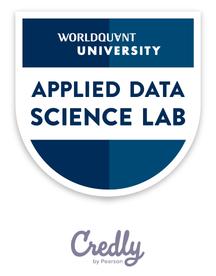Applied Data Science Lab
Learn How to ApplyGain the fundamental data science skills required for this growing field.
- Completely Online
- 100% Free of Cost
- Rigorous Focus on Applied Learning

Learn the fundamentals of data science, entirely free.
By completing a series of end-to-end data science projects, students build the wrangling, analysis, model-building, and communication skills to prepare for success in data-centric careers. They use their skills to build models that predict everything from real estate prices to customer retention, create interactive dashboards that run statistical experiments, and build APIs to incorporate their insights into web applications.
Data science is becoming a cornerstone of modern business. Practitioners use analytical tools and techniques to extract meaningful insights from data that drive critical business decisions. Data scientists are in demand across industries, and the number of positions is projected to grow by 35% through 2030.
Applied Data Science Lab
Rolling Admissions
Upon Acceptance
Entirely free
16 weeks
- Beginner-level Python skills
- Familiarity with basic statistics
- Passing score on Admissions Quiz (66% or higher)
10–15 hours per week
Sharable Credly Certification
“WQU helped me massively in my ML/AI journey. It gave me all the fundamental knowledge I needed in my career.
From WQU, I had more confidence in taking on ML projects. It was a lot easier to continue studying myself as well, and I also got a few decent roles due to the knowledge I gained here.”
What You Will Learn
In this dynamic learning environment, students get real-time feedback and opportunities to collaborate with their peers and participate in live office hours with their instructor. After successfully completing the Lab, students earn an easily shareable WQU badge issued by Credly.
Lab Outcomes
Database Management
Extract data from SQL and NoSQL databases
Data Cleaning and Preprocessing
Clean authentic, messy datasets
Regression & Classification Modeling
Build predictive models for regression and classification
Data Visualization
Create compelling visualizations to explain data characteristics and model performance
Ethics in Machine Learning
Discuss the ethical implications of deploying models in the real world and the environmental impact of machine learning models
Business Insight & Intelligence
Learn how to apply machine learning to business problems
Frequently Asked Questions
How can I prepare for the Admissions Quiz?
Before you can start the Applied Data Science Lab, you need to take a short Admissions Quiz to ensure you have a solid foundation on which you can build the skills taught in the offering. When taking the quiz, you should not use supplementary materials, so close your textbooks and any other browser windows. It is recommended that you have a pencil and paper ready in case you want to write out a problem.
How does the Lab work?
The Applied Data Science Lab is divided into eight two-week projects and was designed to be completed in approximately 16 weeks. Following a prescribed sequence, students complete one project at a time. The projects range from exploring housing prices in Mexico to predicting air quality in Kenya. Students work with publicly available datasets, upon which they can develop larger portfolio projects. The curriculum is deployed on virtual machines, allowing you to code along while you watch project video lectures, collaborate with colleagues in the forums, and receive instant feedback on your work.
What happens if I fail the Admissions Quiz?
If you fail the Admissions Quiz for the Applied Data Science Lab, you have a second (and final) attempt after a 7-day cooling off period. If you fail a second time, you are unable to enroll in the Lab.

